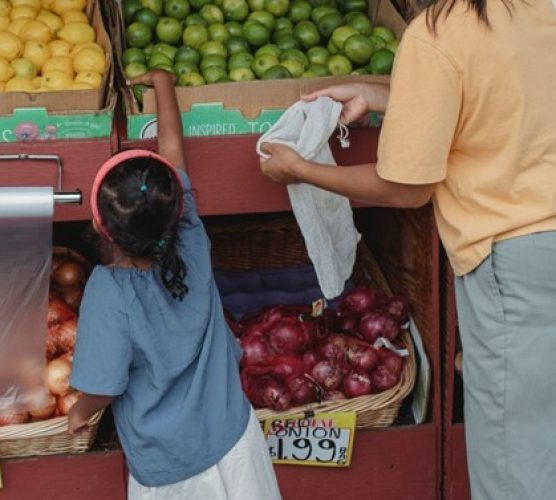What is Veganuary?
Veganuary is an annual campaign that encourages people to try a vegan diet for the month of January. The campaign was created in 2014 to help people start the year off on a healthier and more environmentally sustainable footing by adopting a plant-based diet.
Veganuary aims to inspire people to try veganism for their own health and well-being, as well as to reduce the environmental impact of animal agriculture. The campaign provides resources and support to help people make the transition to a vegan diet, including recipe ideas, nutrition information, and tips for eating out and dining with non-vegan friends and family.
Parents who are looking to raise healthy vegan children often face some misconceptions about the diet. In this article, we will dispel four of the most common myths about plant-based diets.
Myth: Vegan diets are lacking in key nutrients
It’s a common misconception that vegan diets mean missing out on some key nutrients and minerals, with protein, iron and calcium high up on the list. While it’s true that getting enough of certain nutrients can be more difficult on a vegan diet, it’s by no means impossible.
A plant-based diet can provide all the nutrients a baby needs for healthy growth and development. Plant-based foods such as fruits, vegetables, legumes, grains, nuts, and seeds can provide all the protein, fibre, vitamins, and minerals that a growing human needs.
Beans, pulses and seeds and nuts are great sources of protein for plant-based youngsters, while leafy greens, peas and broccoli are a great way to get iron. Calcium can come from dairy-free milk alternatives and tofu, with smaller amounts being found in most fruits and vegetables.
If you’re at all concerned about your little one getting the right nutrients from their plant-based diet, consult with a dietician or your GP, and they’ll be able to point you in the right direction.
Myth: Veganism is expensive.
Plant-based diets are often seen as expensive, especially compared to some more readily-available animal-based food. However, a vegan diet can be affordable, especially if you focus on whole, unprocessed plant-based foods. These foods, such as beans, rice, and vegetables, are often less expensive than animal-based products. In fact, one study by the University of Oxford found that “compared with the cost of current diets, the healthy and sustainable dietary patterns were, depending on the pattern, up to 22–34% lower in cost in upper-middle-income to high-income countries on average.”
It is true that some vegan products, such as vegan meats and cheeses, can be more expensive than their animal-based counterparts. These products are typically made from more expensive ingredients and may also be produced in smaller quantities, which can contribute to their higher price. However, the vegan diet is growing in popularity every year, so specialist vegan items will only get cheaper!
Of course, the cost of a plant-based diet will vary depending on where you live, your preferences, and whether you cook at home or eat out. However, many people who make the swap find that they actually save money on a vegan diet.

Myth: Veganism is inconvenient.
A lot of people see the vegan diet as being unusual and awkward – no-one wants to be “that vegan friend.” But, with veganism growing in popularity, it’s becoming easier and easier to find vegan options – the number of vegans in the UK grew by 360% between 2006 and 2016, and continues to rise! Most restaurants will now offer a vegan option, and meat-free substitutes can be found at almost every supermarket. The growing popularity of the diet also means that there are plenty of resources available to make switching lifestyles even easier – there are plenty of vegan bookshops, websites and other resources to choose from!
Myth: Veganism is unhealthy
Linked to the misconception that vegan diets are intrinsically lacking key nutrients is the belief that those on plant-based diets are more unhealthy, and more prone to falling ill. However, this could not be further from the truth – a plant-based diet is not only healthy for babies, but can actually help prevent common childhood illnesses. For example, switching to a plant-based diet has been shown to reduce the risk of developing asthma, eczema, and other allergies.
Plant-based diets have also been shown to be more nutritionally dense than animal-based diets. This means that they provide more total calories and essential vitamins and minerals per calorie. In addition, research shows that children who are weaned on a plant-based diet are less likely to develop obesity and other chronic diseases later in life.

How can I explore a plant-based diet with my child?
Raising a child on a plant-based diet, or even introducing more plant-based alternatives into their day-to-day, can be a healthy and rewarding experience. Here are some tips to help you successfully make the move towards a plant-based diet with your little one, whether in the short- or long-term:
- Keep things varied – veganism, like all diets, can be boring for children without variety. Make sure your child is eating a range of different foods, including grains, beans,nuts, seeds, fruits and vegetables. This will also help to ensure that your child is getting all the nutrients they need to grow strong and healthy.
- Educate yourself – it’s important to learn about proper nutrition and how to plan a healthy vegan diet. If your child is old enough, and shows an interest in it, you can also teach your child more about why they might choose to follow a vegan diet, such as animal welfare and environmental concerns.
- Don’t expect change overnight – while the adult body can tolerate a quick change from the heavy-eating of the festive period to veganism, children are less tolerant to sudden change in their diet. Start with one or two vegan meals a week, and work up from there! Don’t feel bad if you don’t make it to total-veganism, either – even a part-time plant-based diet can have huge benefits for both your family and the environment.
- Be prepared – while plant-based options are becoming more popular, it’s definitely not guaranteed that there’ll be an option that your little one will enjoy! Always make sure you have vegan snacks on-hand when you’re on-the-go, and plan ahead whenever possible if you’re eating out, to avoid disappointment (and tantrums!)
- Consider fortified foods – some vegan foods, such as plant-based milks and cereals, are fortified with nutrients like vitamin B12, which are important for vegans to include in their diet. These can be hard to find easily, especially if you’re pressed for time to do extensive research – there’s no shame in picking the easier option!
- Ask for help – if you’re not sure about an element of going plant-based, don’t be afraid to seek help! There are tons of resources out there to take advantage of, and there will be plenty of other parents on a similar journey to you. It’s also never a bad idea to consult with a healthcare professional or dietician before making a big change to your childs’ diet.
A vegan diet can be a healthy and nutritious option for young ones when it is well-planned and varied. It’s important for parents to educate themselves about proper plant-based nutrition, and to include a variety of foods in their child’s diet to ensure that they are getting all the necessary nutrients they need to grow strong. With the increasing availability of vegan products and the growing awareness of the benefits of plant-based diets, it is becoming easier and easier for families to follow a vegan lifestyle.



